The lights vanish. Was I dreaming? It seems as if no time has passed.
‘Reverend Tóti?’ I whisper.
He turns over in his sleep.
‘Reverend? May I light a lamp?’
The Reverend does not wake easily — he lolls like a man addicted to drink. I shove him harder than I’d like. He’s embarrassed, I think, to wake and see me in my underthings.
‘What is it?’
‘I had another dream.’
‘What?’
‘May I light a lamp?’
‘The light of Jesus is enough for any true Christian.’ His voice is sluggish with sleep.
‘Please, Reverend.’
He has not heard me. He begins to snore.
I return to my bed then, uncomforted. I can smell smoke.
My Mamma is dead. Inga is dead.
She is lying in rags in the storehouse while the snow and ice clamp their jaws about the earth and forbid the digging of holes, the digging of graves.
So cold she has to wait to be buried.
So lonely I make friends with the ravens that prey on lambs.
I close my eyes and I am creeping down the corridor with the flickering light of my lamp and I am shaking, terrified. I hear the wind howl into the night outside and I think I can hear my foster-mother claw at the storehouse door where she is bundled and waiting to be nailed in the box and buried come spring. I stop walking and I listen hard, and under the wind I think I hear scratching, and then my name — Agnes, Agnes, calling to me. It is Inga calling me to let her out. I’m not dead, I have returned, I am come alive, I need to be let out of the storehouse, not kept like butchered meat, drying in the stale air. Kept with salt and whey and flour crawling with Danish weevils.
I stand still and I shake, scared. Then, Mamma, Mamma! I take a step to the storehouse and push open the door — there is no lock. I push open the door and I hold out the thin light of my lamp, and I see the lump of her body on the floor, her head resting upon a sack of dried fish-heads, and I weep because it is worse to know that she is really dead. Oh, my foster-mother is dead and my own mother is gone. And I sit on the floor, my legs buckled with the pure, ripe grief of an orphan, and the wind cries for me because my tongue cannot. It screams and screams and I sit on the packed earth floor, hard with cold, and smell the fish-heads, sickening, lacing the bland scent of winter with its stench of salt and dried bone.
THE MURDERER FRIDRIK SIGURDSSON was born at Katadalur here in the parish of Tjörn on the 6th of May 1810, and was confirmed by my predecessor here in this parish, Reverend Sæmundur Oddson, in 1823. He was described then as being in possession of ‘a good intellect’, and a good knowledge and understanding of the catechism. However, his behaviour did not answer to this knowledge and education. He girdled himself in blatant disobedience of his parents, so that they complained to me in the autumn of 1825. It was through speaking with them that I learnt of his greatly unbending character.
How his upbringing has been obtained I cannot sufficiently attest to with certainty — I have not, except for four years, been a priest in this parish. However, such is my opinion that he has been raised with too much freedom.
The testimony of the Reverend Jóhann Tómasson.
5th of September 1829
Rev. T. Jónsson
Breidabólstadur, Vesturhóp
To the (Assistant) Reverend Thorvardur Jónsson ,
I write to enquire about your progress with the criminal, Agnes Magnúsdóttir. I recently met with Reverend Jóhann Tómasson of the parish of Tjörn, who deemed it so good as to supply me with a report concerning the spiritual advancement and improved behaviour of the criminal Fridrik Sigurdsson, whom he is supervising. I consider it necessary to meet with you also. Once you, similarly, give me an account of what has and continues to transpire between you and the criminal, I might comprehend to what degree religious instruction is collectively bettering the condemned.
Please present yourself to Hvammur next week to give an account of your transactions with the criminal, and what counsel you have hitherto supplied.
DISTRICT COMMISSIONER
Björn Blöndal
‘THANK YOU FOR COMING, ASSISTANT Reverend Thorvardur,’ Björn Blöndal said, stepping out of the farm door of Hvammur. He had dressed in his official regalia, his red jacket open to reveal a clean, cream shirt. Tóti, who had only met the District Commissioner on a few occasions, mostly when he was a boy travelling with his father, paused in awe at the spectacle of his uniform, and his rather imposing figure.
‘Greetings, District Commissioner Blöndal.’
Tóti dismounted and gave the reins of his horse to a servant man. Hvammur, he noticed, was crawling with people, all going about their chores in the wide yard before the house. A man was gutting trout, caught that morning from the river, on a rock to his left, and two women were spreading clothes out to dry in what slender sun the day afforded. He noticed another servant, a young woman wearing the national headdress of cap and tassel, leading a huddle of four or five children outdoors.
‘Hello,’ they called brightly, nodding their heads in Tóti’s direction.
‘You have a pleasant home,’ Tóti said, smiling, walking up to meet Blöndal.
‘Indeed. Welcome, Reverend. I trust your journey was not too arduous. Please, come inside, and mind your step.’
An older servant woman led Tóti through the labyrinth of corridors to a small guest room. Blöndal followed closely behind and watched in the doorway as she sat Tóti down on an upholstered chair and deftly removed his riding hat and coat.
‘Have you been here before?’ Blöndal asked, as he waited. Tóti realised that he had been gaping at his surroundings.
‘Only as a boy,’ Tóti blushed. ‘This is a very fine quarter. I see you have several etchings.’
Blöndal sniffed and removed his plumed hat, brushing the feather absently. ‘Yes,’ he said, matter-of-factly. ‘We’re very fortunate here to enjoy the luxuries usually only afforded to those on the mainland. Although it is my wish that, within the century, more Icelanders will come to know the benefits of glass windows, wooden panelling, iron stoves, and so forth. I am of the opinion that a drier home allows better circulation of air, and is therefore better for the health.’
‘I am sure you are right,’ Tóti said, looking at the servant busy untying his laces. She glanced at him without smiling.
‘Come, Karitas, leave him alone now,’ Blöndal said. ‘Reverend Thorvardur, if you will follow me to my office.’
‘Thank you, Karitas.’
The servant stood up, holding his shoes, and looked at him as though she was about to say something.
‘Karitas. Leave.’
Blöndal waited until the woman had stepped out of the room, before gesturing for Tóti to follow him. ‘Down this way, if you please, Reverend. My rooms are in a remote quarter of the building. It keeps the roar of the servants from becoming more than a mild disturbance.’
Tóti followed Blöndal down a long corridor, over which more servants and children ran, going into other rooms. Tóti marvelled at the size of the house — it was like no other he had seen.
‘In here please, Reverend.’
Blöndal pushed open a door to a light-filled study. The pale blue walls were lined with two solid bookshelves, filled with leather-bound spines. A large writing desk sat in the middle of the room, its surface gleaming in the sunlight that entered through a tiny curtained window near the peak of the gable.
Читать дальше










